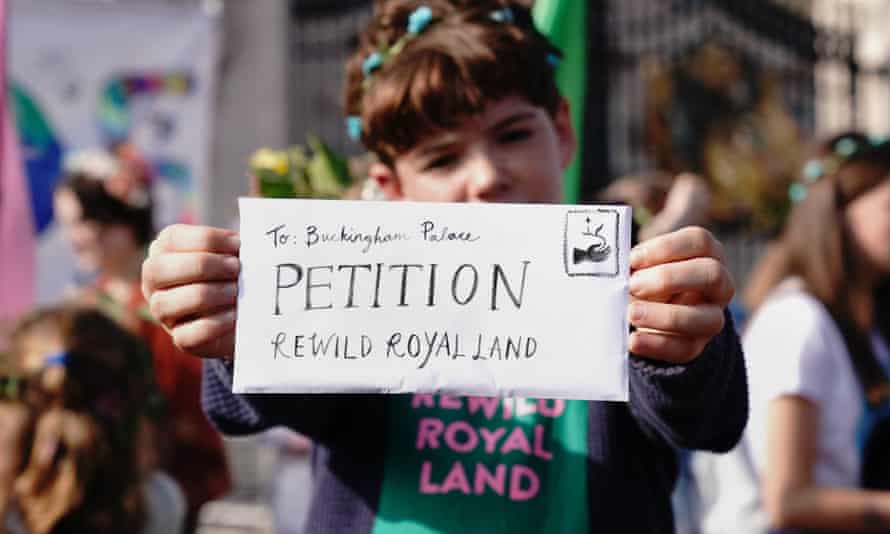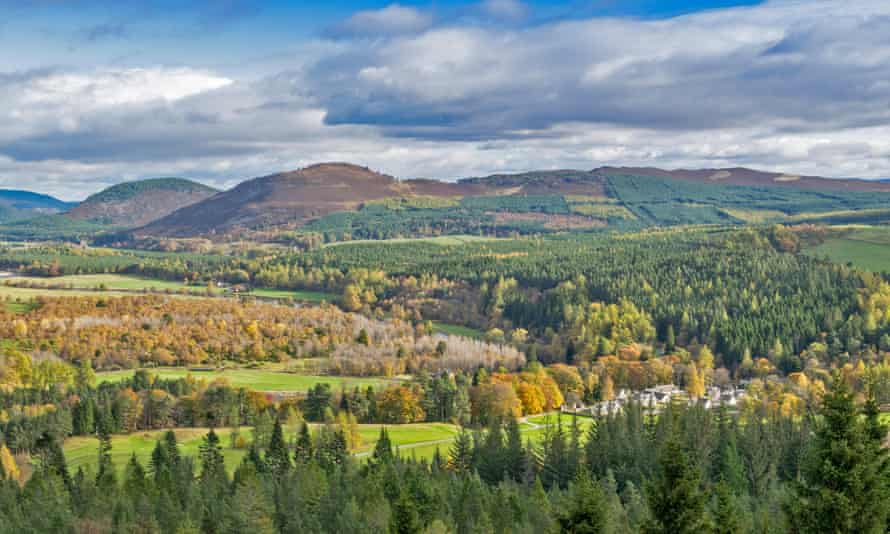Chris Packham asks royal family to commit to rewilding estates
Conservationist delivers petition to Buckingham Palace and urges royals to set example before Cop26

Chris Packham has called on the royal family to “step up” by committing to rewilding their estates before the Cop26 climate summit.
The conservationist and broadcaster delivered a petition signed by more than 100,000 people to the gates of Buckingham Palace on Saturday, accompanied by more than 100 school strikers. Packham said “the time for talking is finished” and urged the royal family to lead by example by improving the ecological condition of their land.
“This is a time for action,” he said. “The time for talking is finished. We’re in desperate trouble and if they were to embrace this prior to the Cop, think what a message that would send to the world. They’re in a very powerful position to do something very powerful. I think it’s time to step up.”
Backed by a brass band, the march went from Green Park to the palace, with some of the crowd and their parents wearing headdresses of leaves and flowers. A 14-year-old, Simeon, was allowed behind the palace gates to deliver the petition to staff.

The Queen and Prince Charles are due to attend Cop26, which starts on 31 October.
The royal family is the UK’s biggest landowning family, with an estate that includes lands held by the duchies of Lancaster and Cornwall and the Queen. According to calculations by the rewilding campaign group Wild Card, the family owns more than 323,748 hectares (800,000 acres) of land, including the crown estate, which is equivalent to double the area of Greater London or 1.4% of the UK.
“That’s a very large amount of land,” said Packham, 60. “And quite a lot of it is not in what I would call good ecological condition.”
Citing Balmoral as an example, he said ideally the 20,234-hectare estate should be covered in temperate rainforest. But instead it is largely managed for grouse shooting and deer stalking. “So that land is not working to its greatest advantage to us at this critical point.” He also said that, overall, royal land had less forest cover than the national average.

“With 1.4% of the land surface they could do enormous good. Leading by example is the best way to lead and a lot of people follow their example,” he added.
The benefits of rewilding include carbon capture, biodiversity and flood prevention. The UN has said the world must rewild and restore an area the size of China by 2030 in order to meet climate and nature commitments.
The submission of the petition, which was preceded by a march from Green Park tube station to the palace accompanied by a jazz band and the environmentalist choir SOS from the Kids, is the latest action by Wild Card.
In June they wrote an open letter to the royal family signed by 120 people, including Packham, the broadcasters Hugh Fearnley-Whittingstall and Anita Rani, and the leading environmental scientist Prof Sir Robert Watson.
Packham said it was children who would inherit “this awful mess that we’ve made” and that adults should be doing everything they could to take action.
Noah Macaulay, 16, a sixth-form student from Hampshire and one of the founders of SOS from the Kids, which is also going to perform at Cop26, said if the royal family rewilded their land “it would have huge benefits for nature and the climate”.
He also called for the government to take “quick and decisive action” on climate, adding, “because if we leave it much longer it may not be fixable at all”.
A Royal Estates spokesperson said: “Members of the royal family have a longstanding commitment to conservation and biodiversity, and for over 50 years have championed the preservation and development of natural ecosystems.
“The royal estates are constantly evolving and looking for new ways to continue improving biodiversity, conservation and public access to green spaces, as well as being home to thriving communities and businesses which form part of the fabric of the local community.”